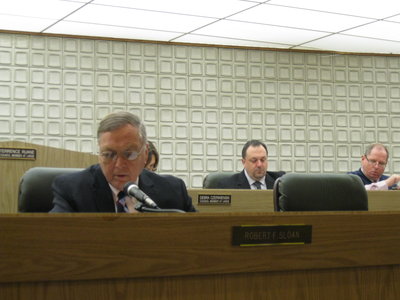With Bayonne industry in decline for decades, the City Council at its Jan. 16 meeting took another step to support the expansion of Royal Wine by introducing an ordinance that would allow the company to secure a low-interest loan from the state and passing a resolution that would seek approval for this move by the local finance board.
The $17.5 million loan would cover nearly half of the $32 million cost of construction for the project located on East 22nd Street behind the Bayonne Crossing Mall.
Although the state Redevelopment Area Bond will be taken out by the city, Royal Wine will pay it back with no obligation to the city, said Attorney Joseph Baumann, who oversees the process for the city.
Unlike a similar loan that the city and county had to guarantee for the construction of nearby Bayonne Crossing Mall, the city is under no obligation and this bond does not increase municipal debt.
“This is more like the loan for Royal Caribbean,” Bauman said.
City officials said Royal Wine Corp. is solely responsible for payment to the state, and that the state program allows the company to get a variety of state level tax breaks as a result.
This follows the City Council’s approval last October of a tax abatement for the project, which will become the new U.S. headquarters and production plant for Royal Wine. The building will include a 150,000-square-foot hydroponic greenhouse with an expected output of eatable food stuff on the equivalent of a 20-acre farm.
Sheldon L. Ginsberg, executive vice president and chief financial officer for Royal Wine, said the hydroponic farm on the roof is the first in New Jersey, and will supply fresh vegetables – that are kosher – to local markets throughout the area. Because the farm does not use soil or have to worry about insects, it meets the requirements of Kosher products. More importantly, because these will be shipped locally, as opposed to being transported from distant parts of the country and the globe, markets such as Whole Foods and other organic markets will have fresh products to sell.
“Many restaurants have to throw out vegetables because they go bad quickly,” Ginsberg said during a brief interview after the meeting. “But these will have a longer life.”
“This is more like the loan for Royal Caribbean.” – Joe Bauman
__________
New facility will add jobs
The project is being developed by a group called Cameron Royal Development LLC, the company that recently built Bayonne Crossing Mall, which borders the new 14-acre development site.
Royal Wine already has a facility in Bayonne on LeFante Way. New York State offered the company a significant package to relocate its operations to Brooklyn, but Royal Wine – which is the largest manufacturer of kosher products in the United States – decided to relocate its headquarters and expand its operations in Bayonne instead.
Ginsberg said Bayonne had always been first choice for expansion.
The project will not only retain the 200 jobs that Royal Wine currently provides with its Bayonne operations, but would add about 120 more jobs and allow the company to consolidate its operations in Bayonne and close its current facility in Brooklyn.
This will also include construction jobs during the building phase, and the company has agreed to an apprentice program.
The $32 million redevelopment project is located at East 22nd Street and Avenue J, at 100 Hook Road. It will include a 247,000 square foot building, 230,000 square feet of which will be for warehouse space and associated uses with loading docks; 47,000 square feet of office space; and 270 parking spaces outside.
The 30-year payment in lieu of taxes will net the city about $16 million in total taxes as opposed to the $6 million over that same period if left vacant.
Bauman said combined with the existing taxes already being paid for site on LeFante Way, the company would be paying about $1 million in taxes to the city annually.
In response to questions from the public City Business Administrator Steve Gallo said that this will not add to the city debt, and said that Mayor Mark Smith came into office establishing a policy to pay down the city debt and to avoid adding to debt that has caused significant budget problems in the past.
On top of this, the project would clean up what was considered a very toxic site, due to decades of use first as an oil storage area and then later for chemical processing.
When testifying last year before the Bayonne Planning Board Eric Alderman of Cameron Group said his company’s good relationship with the state and Exxon Mobil from the construction of Bayonne Crossing would bring the necessary resources together to clean up the site and allow this project to move ahead.
